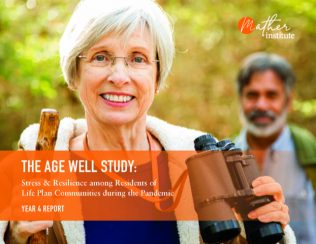Mather Institute Announces New Findings in Year 4 of Landmark Study
January 21, 2022
Does being an extrovert make the pandemic less stressful for older adults? Can meditation help? What factors are related to the stress and resilience of Life Plan Community residents during the pandemic? These questions and more were explored in great depth in Year 4 of the landmark, five-year Age Well Study being conducted by Mather Institute. Year 4 findings are being issued today in a free report available for download by Mather Institute at www.TheAgeWellStudy.com. The Study is now entering its fifth and final year and is the only national longitudinal study to evaluate the impact of living in a Life Plan Community on residents’ health and well-being.
From the first year of the study, released in 2018, it showed that Life Plan Community residents tend to have greater emotional, social, physical, intellectual, and vocational wellness than their counterparts in the community-at-large. Year 2 of the study revealed that residents with higher scores of “openness to experience” and “extroversion” reported the highest levels of healthy behaviors. Year 3 of the study turned to factors related to residents’ happiness and life satisfaction, finding that residents are happier and more satisfied when they have a greater sense of community belonging.

The timing of the Year 4 study, during this unique time in history, enabled Mather Institute to explore how residents responded to the COVID-19 pandemic and learn what made them more or less resilient.
“No one could have predicted we’d experience a pandemic in the middle of a longitudinal study, but that made this year even that much more intriguing,” said Cate O’Brien, Vice President and Director, Mather Institute. “The Year 4 findings illustrate how many critical factors can impact emotional wellness – especially during times of stress. The results provide insights about the importance of relationships, community, and mindfulness, to the resilience and well-being of older adults.”
Highlights from Year 4 provide a deeper understanding of how specific individual and organizational factors, changes in the quality of social relationships, and coping strategies are related to residents’ response to the COVID-19 pandemic. These findings include:
- Life Plan Community residents, on average, exhibited low levels of stress and high levels of resilience during the pandemic.
- Those who were open to new experiences and exhibited higher levels of extroversion and agreeableness were less likely to exhibit stress and more likely to exhibit resilience during the pandemic
- Residents who maintained quality relationships with children exhibited greater resilience during the pandemic.
- Residents who meditated during the pandemic were less likely to exhibit stress.
- Residents who lived in smaller communities were less likely to be stressed compared to residents of bigger communities.
“The purpose of the Age Well Study is to help providers and residents better understand the impact of living in a Life Plan Community on residents’ health and wellness,” said Mary Leary, President and CEO, Mather. “Our latest findings can be used to inform the development and customization of programs and resources to alleviate residents’ stress and cultivate their resilience as we continue through the COVID-19 pandemic. It also teaches us the importance of an individualized approach when aiming to promote wellness within senior living communities.”
The Age Well Study measures residents’ self-reported health and wellness metrics through a survey taken annually over five years. Study findings are based on survey responses from 3,441 residents in 122 Life Plan Communities across the United States. Results are being compared against a demographically similar sample drawn from the Health and Retirement Study (HRS) conducted by the University of Michigan. Mather Institute’s research partners include Northwestern University, ASHA, LeadingAge, Ziegler, Novare®, Life Care Services, and National Investment Center.